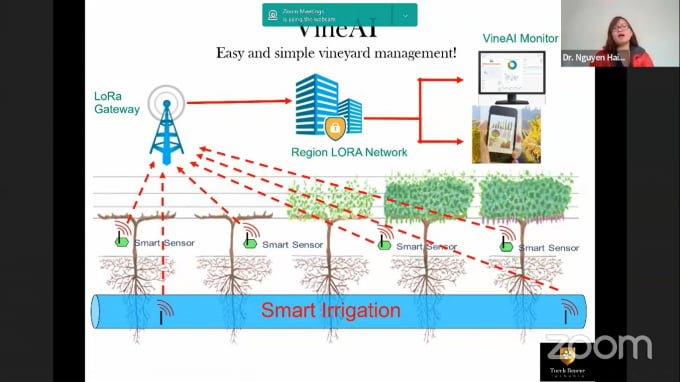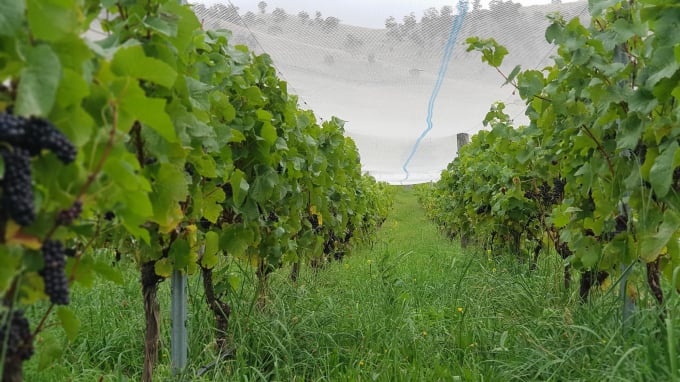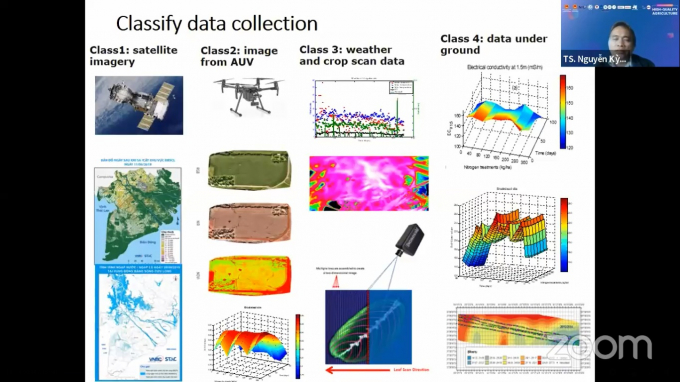June 15, 2025 | 12:17 GMT +7
June 15, 2025 | 12:17 GMT +7
Hotline: 0913.378.918
June 15, 2025 | 12:17 GMT +7
Hotline: 0913.378.918
At Theme 2 of the International Conference on High-Quality Agriculture Vietnam 2022, recently held in Hanoi, Dr. Nguyen Hai Anh, Director of Torch Bearer Tasmania, an organization specializing in clean wine production in Tasmania, Australia, shared her real experience and knowledge regarding the adoption of technologies in clean grape cultivation.
In her presentation on "Application of IoT and AI in agriculture to produce clean grapes - Is this really the direction of future development", Dr. Nguyen Hai Anh shared that the starting point of a scientist and engineers shifting to work in the field of agriculture has gained her a fresher view of the agricultural industry, not only in Australia and some countries around the world. According to her, the agricultural business in some countries, such as Vietnam, is still fairly conventional and classical, and farmers have yet to place a significant emphasis on using technology for parameter measurement, data gathering, and information analysis.

The Vine-AI was formed with the intent of denouncing the misconception that farming is laborious.
"Even on medium-sized farms in Australia, the absence of autonomous technologies and digital management has resulted in inefficient management, poor and uneven quality, and waste of resources," Dr. Hai Anh explained.
With years of experience conducting research and working as an engineer and researcher, she usually questions the adoption of new technologies in the stream of Industry 4.0 and subsequently Industry 5.0 in order to create more sustainable and efficient agriculture. As a result, the Vine-AI was formed with the intent of denouncing the misconception that farming is laborious.
The Vine-AI project is carried out on a farm where neither pesticides nor chemical agents are used, thus the monitoring task must be accomplished swiftly and efficiently. In reality, farmers must walk a total of around 22 kilometers to measure parameters and monitor crops on a 15-hectare farm, and the findings are not always accurate. However, when the project was implemented, soil, humidity, temperature, pressure, and wind measurement systems were installed throughout the farm, the parameters were collected via LoRA technology (long-distance communication technology) and uploaded to the "cloud" before being analyzed by the computer so that farmers could make more effective farm management decisions.

After 3 years of using technology, the farm's grape output has increased by 50% per year while the output is guaranteed to be clean with "no fertilizer", and "no pesticide". Photo: Torch Bearer Tasmania.
"Being a Vietnamese ex-pat, I'm continually thinking about how to create an autonomous monitoring system that allows Vietnamese farmers to remotely observe and manage their fields."
According to Dr. Hai Anh, the cost of input technologies is often quite high, the technologies are sometimes quite costly and fragmented, sensor systems and data analysis are not affordable for small and medium-sized growers, and it is necessary to optimize energy and minimize maintenance time for the machinery."
Farmers of grapes in Vietnam have encountered a number of challenges due to climate change. Some ideas, such as planting grapes in a membrane house or the Y-frame model, have been created to adapt to the climate with some positive outcomes; nonetheless, there has been no breakthrough in the use of advanced technology in grape gardens and farms.
Dr. Nguyen Ky Tai, a senior researcher at the University of Southern Queensland (Australia), presented a presentation "Big data platform and AI in agriculture" to discuss the topic of AI in agriculture.

The research team of Dr. Nguyen Ky Tai, a Senior Researcher at the University of Southern Queensland, has developed a system for applying big data (Big Data) and artificial intelligence (AI) in agriculture in Australia.
Current influences on Vietnam's agriculture include climate change and the market; small-scale production; traditional markets continue to account for a significant percentage of the agricultural value chain...
Dr. Nguyen Ky Tai proposed a number of AI-based solutions to address the problems, including Machine Learning, Computer Vision, the Internet of Things (IoT), Big Data applied to precision agriculture, and analysis of growing area data through drones to assist in the comprehensive monitoring of crops and livestock. The programs are efficient in optimizing the quantity of water, fertilizers, and pesticides utilized and enhancing the ability for crop management.
“One of the differences between agriculture 4.0 and 5.0 that is being discussed by researchers is the systematic linking of technologies rather than following the leading technology. The agricultural system is no longer just concerned with the output standards of food or livestock, but also with the environment, post-production processing technologies, the supply-demand market, etc. We must analyze all the elements impacting agriculture and farmers as a system rather than considering them individually.
Translated by Dieu Linh

(VAN) The working delegation from the Ministry of Agriculture and Environment conducted an important trip to the Netherlands to strengthen strategic partnerships and sustainable development in the agricultural sector.

(VAN) The letter ‘A Plea from the Ocean’ not only evokes emotion but also awakens the human conscience to the responsibility of protecting life on Earth.

(VAN) The Department of Agriculture in South Africa has announced the country’s first mass vaccination of poultry to prevent local birds from contracting avian influenza.

(VAN) Establishment of the Mekong Delta Regional Agricultural Linkage Center, aiming for a closed value chain, deep processing, trading platforms, and international market connectivity.

(VAN) Gia Lai province has recently recorded 460 rare species of animals and plants, contributing to forest conservation and biodiversity planning in the region.

(VAN) Ms. Caroline Beresford, New Zealand Ambassador to Vietnam, expressed confidence that agricultural cooperation between Vietnam and New Zealand will develop sustainably, be climate-resilient, and promote gender equality.

(VAN) Vietnam reaffirms its commitment to international cooperation in fostering sustainable and responsible fisheries while ensuring resilient livelihoods for small-scale fishing communities.